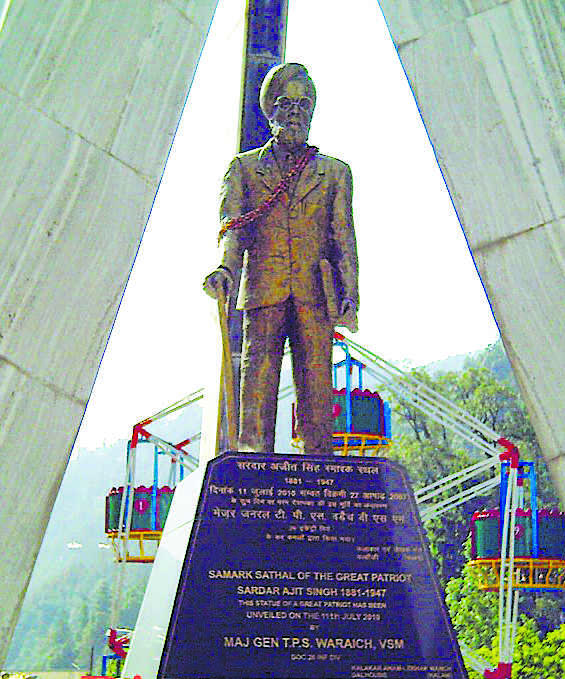Hero who kept death at bay till Aug 15, 1947
RK Prashar
“Doosaron ko hasane ke liye kisi ek ko rona chahiye,
Anek ko surakshit rakhne ke liye ek ko yatna sehni chahiye,
Aur anek ko jeevit rakhne ke liye kisi ek ko marna chahiye.”
It was the message of Sardar Ajit Singh, whose death anniversary falls on every Independence Day, to the nation’s youth.
Sardar Ajit Singh, the name may not ring a bell among the youth of today. Legend goes that this forgotten hero, an uncle of martyr Bhagat Singh, breathed his last on August 15, 1947, holding on to life till he heard the news of India’s independence.
Unfortunately, no one pays him even a perfunctory homage at his memorial in Panjpulla in Dalhousie.
Born in 1881 in Khatkar Kalan village of Jalandhar district in Punjab, Ajit Singh received his primary and secondary education at the Sain Dass Anglo Sanskrit School in 1894 in the same district.
During the course of his profession as a teacher, in 1906 he formed a trade union comprising Class IV employees who had been working in government offices and courts. That’s when his welfare work for widows, the poor and the orphans also began.
While attending the Congress session in Calcutta (now Kolkata) under the chairmanship of Dadabhai Naoroji, he got the idea of launching a mass campaign in Punjab to stir the masses there about the freedom movement.
This coincided with the release of revolutionary Sufi Amba Prasad from prison after five years. He and Ajit Singh met and the outcome was the formation of the Bharat Mata Society, one of the first revolutionary groups in India. As the British government levied new taxes on Jat farmers in Lahore and Amritsar, the Bharat Mata Society was quick to oppose it. Ajit Singh arranged a hectic tour and addressed over a dozen public meetings, cautioning his countrymen against paying the water tax and sundry other taxes.
Ajit Singh performed two very significant tasks during his lifetime. First, he prepared the outline of the Indian constitution. Secondly, he discovered a secret code of communication by means of which he used to write letters to like-minded people living in and outside the country.
He along with Lala Lajpat Rai was arrested and banished to Mandalay (Myanmar) in 1907. But after failing to establish authentic proof, the British authorities released both of them after six months of captivity. Later, during his self-exile, Ajit Singh came into contact with the Ghadar Party in San Francisco.
Even during World War I, Ajit Singh relentlessly continued his freedom struggle. When he was in Rome, the British took him into custody there.
Following the formation of the interim government in India in 1946, people impressed upon Prime Minister Jawaharlal Nehru to secure the immediate release of Ajit Singh.
In the meantime, a meeting of the foreign ministers of Allied Nations was to be held at Paris in which the release of the POWs was to be discussed. VK Krishna Menon, who represented India, managed to secure Ajit Singh’s release.
Soon after reaching his homeland, Ajit Singh fell seriously ill. Thereupon he was shifted to Dalhousie — a natural sanatorium — for convalescence. He was accompanied by his wife Ram Kaur.
Before that, Ajit Singh had once taken refuge in Dalhousie in 1905-06 to escape arrest on criminal charges levelled against him.
It was apparently his long-cherished desire to leave the world for good after hearing of the declaration of India’s independence.
And that’s how it happened. At 12 midnight, just before the August 15, 1947, morning, several residents of Dalhousie went to Spring Hotel to felicitate the great freedom fighter on the declaration of India’s independence.
Having heard the news, he uttered his last words: “Thank god, my aim is fulfilled and now I am leaving this world for good!” That is how this hero of the freedom struggle breathed his last — in free India.









